Olivia Ball’s publications
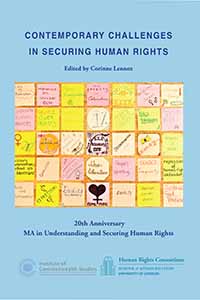 'Remedy Australia: Because every human rights violation should be remedied ', in C. Lennox (ed.), Contemporary Challenges in Securing Human Rights (Institute of Commonwealth Studies, London 2015)
'Remedy Australia: Because every human rights violation should be remedied ', in C. Lennox (ed.), Contemporary Challenges in Securing Human Rights (Institute of Commonwealth Studies, London 2015)
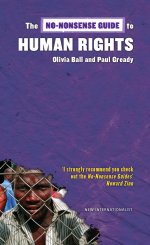
The No-Nonsense Guide to Human Rights 2nd edn, by Olivia Ball & Paul Gready (New Internationalist, Oxford 2009) with foreword by Nobel Peace Prize Laureate, Desmond Tutu.
". . . by far the best condensed summation of the modern human rights movement anywhere."
– Law Institute Journal, 2007
Human rights hold profoundly radical potential, by contesting power and asserting the equality and dignity of every last person. A power-packed pocket handbook of history, philosophy, politics, law and more. Ringing with first-person voices, this is an activist's and owner's manual.
Available from Amnesty International and New Internationalist online shops or through Amazon.
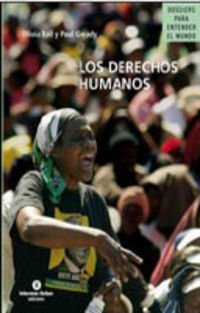 Los Derechos Humanos, a Spanish-language edition of The No-Nonsense Guide to Human Rights by Olivia Ball & Paul Gready (published by Oxfam Spain, 2009) is available for about €14 from Abe Books, Altair, Casa del Libro, Libreria Compas and La Isla Libros and all good bookshops.
Los Derechos Humanos, a Spanish-language edition of The No-Nonsense Guide to Human Rights by Olivia Ball & Paul Gready (published by Oxfam Spain, 2009) is available for about €14 from Abe Books, Altair, Casa del Libro, Libreria Compas and La Isla Libros and all good bookshops.
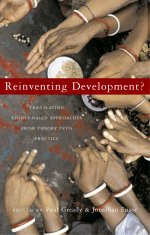 P Gready & J Ensor (eds), Reinventing Development? Translating Rights-based Approaches from Theory into Practice (Zed Books, London 2005) Concluding chapter by Olivia Ball
P Gready & J Ensor (eds), Reinventing Development? Translating Rights-based Approaches from Theory into Practice (Zed Books, London 2005) Concluding chapter by Olivia Ball
The recognition that the persistence of poverty is closely linked to the denial of human rights has propelled rights-based approaches into the policy and practice of many development NGOs, UN bodies and aid agencies. This book presents the practical experiences of development practitioners who have tried to apply a rights-based approach in their work. Its aim is to increase understanding of the approach by drawing on bottom-up insights, and to identify what difference a rights-based approach makes in practice. What is the 'value added' of a rights-based approach? What difficulties and tensions arise? The case-studies span development, humanitarian relief and conflict resolution. The book concludes that there is potential not only for human rights to reinvent development, but for development to reinvent human rights.
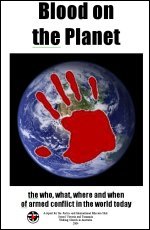 Blood on the Planet: The Who, What, Where and When of Armed Conflict in the World Today, by Olivia Ball & G Tieman (Uniting Church in Australia, Melbourne 2004)
Blood on the Planet: The Who, What, Where and When of Armed Conflict in the World Today, by Olivia Ball & G Tieman (Uniting Church in Australia, Melbourne 2004)
Since the 11 September 2001 terrorist attacks in the US, there has been an increase in global militarism and international arms transfers. Beyond the death, injury, grief and psychological trauma associated with the violence of war, the impact of armed conflict includes large-scale forced displacement, the abuse of children as soldiers and sex slaves, disruption of agriculture, commerce and development and the supply of essential goods and services, property damage, destruction of the environment and the violation of many human rights.
Most armed conflicts, especially those that do not involve forces from English-speaking, industrialised countries, gain little coverage in mainstream media. Conflicts in Africa in particular receive a tiny fraction of media coverage in the developed world. Blood on the Planet is an overview of armed conflicts around the world and a resource to track conflicts into the future, with an extensive list of websites and other resources that monitor armed conflicts around the globe. Contact jim@victas.uca.org.au for a copy.
‘Country Profile: Kingdom of Tonga’ by Olivia Ball, New Internationalist, No. 366 (April 2004)
‘Worldbeaters: Taking aim at the rich and powerful’ by Olivia Ball, New Internationalist, No. 358 (July 2003)
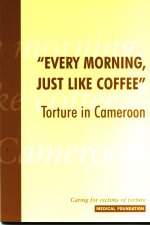 Every Morning, Just like Coffee: Torture in Cameroon by Olivia Ball (Medical Foundation for the Care of Victims of Torture, London 2002)
Every Morning, Just like Coffee: Torture in Cameroon by Olivia Ball (Medical Foundation for the Care of Victims of Torture, London 2002)
If you have been tortured in Cameroon, you are probably dead. If you have been tortured and have survived and escaped to Britain, this study shows that you are probably a young man or woman of around 28, married with children. You are likely to be Roman Catholic and speak French. This is probably not the first time you have seen the inside of a police lock-up, nor the first time you and your family have suffered grave human rights violations by agents of the state. You are a political, human rights or labour activist, although you may just have been in the wrong place at the wrong time. Don’t expect to be charged or brought to trial. You can expect to be beaten and ill-treated and kept in foul conditions. Stripped naked, you will be housed in a dark, airless, overcrowded cell with no toilet. The guards may jokingly call your daily excursions from your cell for a beating or torture session un petit café. It’s as regular as morning coffee.
The prevalence of torture in Cameroon was such as to warrant a country visit from the UN Special Rapporteur on Torture in 1999. He described the use of torture in Cameroon as “widespread and systematic,” a phrase is almost identical to that used in the statute of the International Criminal Court, to which Cameroon is party. The Statute defines “widespread or systematic” use of torture against any civilian population as a crime against humanity, and the Court has jurisdiction to prosecute any such international crimes committed after 1 July 2002.
This report provides evidence of torture and other persecution provided by 60 Cameroonians who fled to the United Kingdom and first sought the assistance of the Medical Foundation for the Care of Victims of Torture in London in 2000 and 2001.
"Nothing has been more crucial on the Cameroon human rights front than her report a decade ago.”
– Milton Krieger, Emeritus Professor at the University of Toronto
& author of Cameroon’s Social Democratic Front (2008)
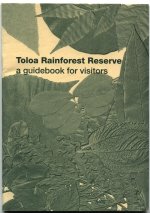 Toloa Rainforest Reserve: A Guidebook for Visitors by Olivia Ball (Vava’u Press, Suva 2001)
Toloa Rainforest Reserve: A Guidebook for Visitors by Olivia Ball (Vava’u Press, Suva 2001)
The tiny Kingdom of Tonga is one of the best-kept secrets of the Pacific. Toloa Rainforest Reserve is the last remnant of the rainforest that once covered the main island. For armchair tourists or those who find their way there, this indispensible guide is redolent with the sights and sounds of the forest. Facts of geography, botany and zoology are enriched with culture, legend and indigenous medicine. Discover the 'sensitive plant' that closes its leaves when touched and wonder at the 'grey ghost', Tonga's giant skink, probably extinct. Beautifully and accurately illustrated, complete with bilingual index.
Available from the Friendly Islands Bookshop in Nuku'alofa or from Tupou College, guardian of the forest at Toloa.
